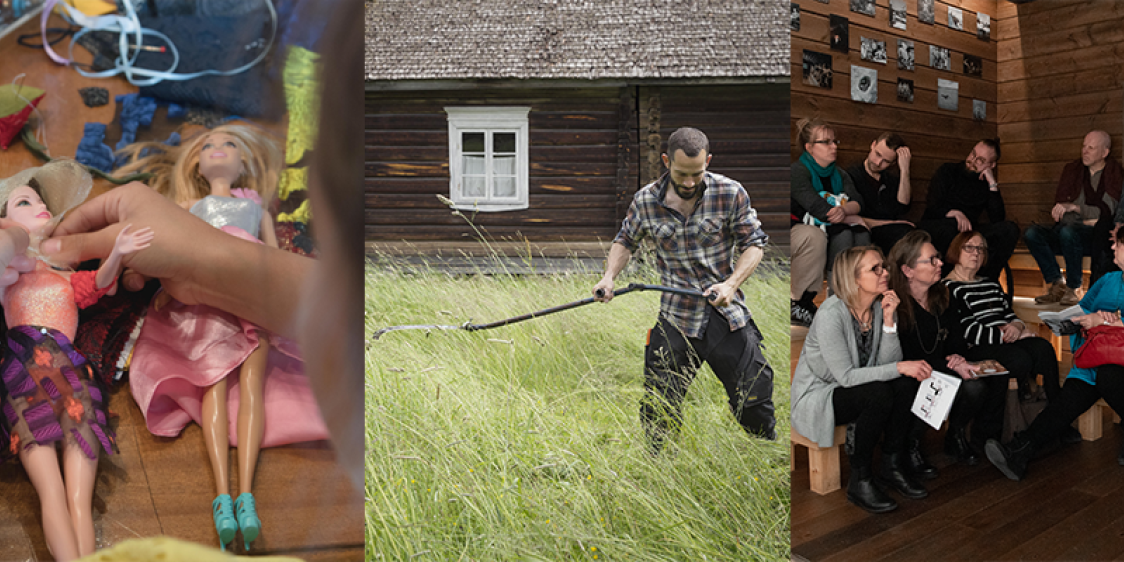
Nordic Museums and Intangible Cultural Heritage
The webinar presents concrete tools for the museums to dive deeper into living heritage and engage more profoundly with the communities, groups and individuals related to it. Furthermore, case examples from several Nordic museums will be heard. Interactive workshops with international professionals provide the participants with hand on tools to reflect on the work in their own museums.
What is intangible heritage? How does the UNESCO 2003 Convention affect the work of museums in Nordic countries? How can our museum engage with intangible heritage, that is represented in their collections, lived by their audiences, embodied by their stakeholders? Who are the communities, groups and individuals museums could work with?
Intangible cultural heritage is a bridge between traditional and contemporary cultural values. It is the living expression of oral traditions, craft skills, artistic, social or ritual customs, knowledge and know-how handed down to us by previous generations.
The UNESCO Convention on the Safeguarding of the Intangible Cultural Heritage (2003) has been ratified in all of the Nordic countries. Active safeguarding work is being done in all countries and national inventories in each country gives visibility to many kinds of living heritage.
The inspiration for the seminar stems up from the recent three-year ICH and Museums Project (IMP) that explored the interaction of museum work and intangible heritage practices in a comparative European context, with partner organizations from Belgium, The Netherlands, France, Italy and Switzerland. The Project also collaborated with the International Council of Museums, NEMO – Network of European Museum Organisations and the ICH NGO Forum.
The webinar is organised by the Finnish Heritage Agency in cooperation with the Intangible Cultural Heritage and Museums Project / Workshop intangible heritage (BE); Institute for Language and Folklore (SE); Arts Council Norway; Danish Folklore Archives; Ministry of Culture, Iceland; Greenland’s National Museum and Archive; Ålands museum (FI) and Cultural Ministry of the Faroe Islands.
Programme 12th October 2020
13.30 Welcome, Tiina Merisalo, General director, Finnish Heritage Agency
13.40 ICH and Museums Project, Kia Tsakiridis, Workshops intangible heritage (BE) (video)
14.00 Experiences from Finland, Leena Marsio, Finnish Heritage Agency (video)
14:15 Coffee break
14:20 Case studies from the Nordic countries
- Transmission of Storytelling in a Museum, Meg Nömgård, Storytelling Museum (SE)
- ICH in the Museum Strategy, Reetta Karhunkorva, Forest Museum LUSTO (FI) (video)
- Sami Museum and Safeguarding Crafts, Anne May Olli, RiddoDuottarMuseat (NO)
- Museum´s Role in Urban Development and Safeguarding, Guðbrandur Benediktsson, City Museum Reykjavik, Iceland
- Challenges in Documenting ICH, Kirstine Møller, National Museum of Greenland
15:10 Discussion
15:20 Coffee break
15:25 Workshop in groups on how to decide what intangible heritage is relevant in relation to your museum, on who to involve, and how to decide on the intensity of collaboration. Moderated by members of the IMP team (Kia Tsakiridis - Workshops intangible heritage (BE), Sophie Elpers - Dutch Centre for Intangible Heritage, Tamara Nikolić Đerić - Ecomuseum Batana Ecomuseum (CR)
16.10 Summing up of the workshops
16:20 Conclusions, Sergio Servellón, NEMO - Network of European Museum Associations
16.30 End of the webinar
More information on the work with the ICH and Museums project and toolkit:
More information on the work with the UNESCO 2003 Convention:
- Finland: https://wiki.aineetonkulttuuriperinto.fi/
Leena Marsio, Finnish Heritage Agency leena.marsio(at)museovirasto.fi
Staffan Beijar, Ålands museum Staffan.Beijar(at)regeringen.ax - Sweden: https://www.isof.se/om-oss/levande-traditioner---immateriella-kulturarv-/forteckningen.html Annika Sjöberg, Institute for Language and Folklore, Sweden annika.sjoberg@isof.se
- Norway: https://www.immateriellkulturarv.no/ Hildegunn Bjørgen, Kultturådet – Arts
Council Norway Hildegunn.Bjorgen(at)kulturradet.no - Iceland: https://lifandihefdir.is/ Rúnar Leifsson, Ministry of Culture, Iceland runar.leifsson(at)mrn.is
- Denmark: https://levendekultur.kb.dk/index.php/Forside
Marianne Holm Pedersen, Danish Folklore Archives mape(at)kb.dk - Greenland: https://en.nka.gl/heritage/intangible-cultural-heritage/ Kirstine Eiby Møller, Greenland’s National Museum and Archive kirstine(at)natmus.gl
- Faroe Islands: https:// www.livandimentan.fo Armgarð Weihe, Cultural Ministry of the Faroe Islands ArmgardW(at)ummr.fo